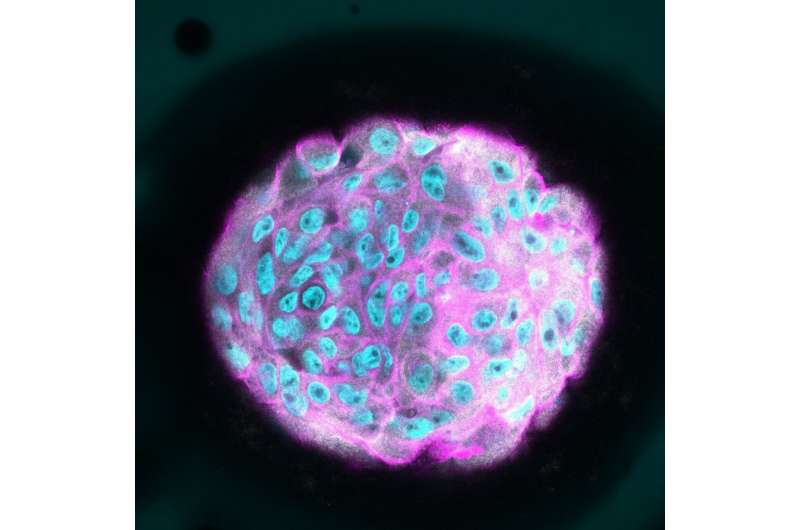This article has been reviewed according to Science X's editorial process and policies. Editors have highlighted the following attributes while ensuring the content's credibility:
fact-checked
peer-reviewed publication
proofread
Preventing tissue's response to stiffness may be key to slowing the progression of breast tumors

Cells are capable of translating mechanical changes into biological responses. This process is known as mechanotransduction and plays a fundamental role in the progression of solid tumors, such as breast cancer.
It is well-established that a common mechanical alteration in cancer progression involves tissue hardening. This stiffness is precisely what is detected during self-examinations or breast palpations for potential tumor detection. The stiffness of breast tissue triggers a chain reaction, inducing tension within cells and distorting their nuclei. Ultimately, this nuclear deformation activates genes responsible for controlling cell proliferation, which are closely associated with tumor growth.
A study published today in the journal Nature Materials demonstrates a cellular mechanism that could be pivotal in slowing the progression of breast tumors. The results of the study, led by Pere Roca-Cusachs, the principal investigator at the Institute of Bioengineering of Catalonia (IBEC) and the University of Barcelona, indicate that laminin, a protein that provides structure and support to healthy breast tissues, hinders the mechanotransduction process in cells, thereby protecting the nucleus from deformation.
"Our findings demonstrate that the presence of laminin mitigates the effects of stiffness, effectively shielding cells from tumor growth. We have showcased this mechanism in vitro, but we believe it holds potential for in vivo application, considering what we have observed in samples from breast cancer patients," explains Zanetta Kechagia, postdoctoral researcher at IBEC and first author of the study.
"Through this mechanism, which we have shown can prevent the invasion of tumor cells, there is potential for the development of more sensitive diagnostic tools or even new therapies for breast cancer. However, further research will be needed to explore these possibilities," Pere Roca-Cusachs, IBEC researcher, Serra-Hunter associate professor at the University of Barcelona (UB) and leader of the study, explains.
It has already been demonstrated that an increase in tissue stiffness triggers mechanical responses within cells. The most common responses are associated with alterations in the cell's cytoskeleton, affecting its interaction with the surrounding tissue and facilitating migration. Additionally, this stiffness leads to the activation of the YAP protein, which enters the nucleus and initiates the expression of genes linked to cell proliferation.
To study the mechanotransduction process, the research team cultured breast tissue cells on gels with varying stiffness to mimic both healthy (soft) and malignant (stiff) tissues. They compared the behavior of the cells on gels coated with laminin to those on gels coated with collagen or fibronectin, which are other cell-supporting proteins that are overproduced in carcinogenic processes.
Thus, the researchers observed that the cells seeded on the laminin-rich gel had a very mild mechanical response to the stiffness of the substrate, compared to those seeded on the gels rich in collagen and fibronectin.
As a result, the researchers observed that the cells seeded on the laminin-rich gel exhibited a significantly less pronounced mechanical response to the substrate's stiffness when compared to those seeded on gels abundant in collagen and fibronectin.
"These results represent the culmination of over six years of work, during which we received support from the European Commission and collaborated with a team of international institutions, led by IBEC, to better understand how mechanical forces impact breast cancer," said Daniel Caudepón, IBEC project manager overseeing the coalition known as MECHANO·CONTROL.
This research also includes significant contributions from other institutions participating in MECHANO-CONTROL, such as Pablo Sáez and Marino Arroyo from Universitat Politècnica de Catalunya, and Thijs Koorman and Patrick Derksen from University Medical Center Utrecht, The Netherlands.
More information: Kechagia, Z. et al. The laminin–keratin link shields the nucleus from mechanical deformation and signalling. Nature Materials (2023). DOI: 10.1038/s41563-023-01657-3. www.nature.com/articles/s41563-023-01657-3



















